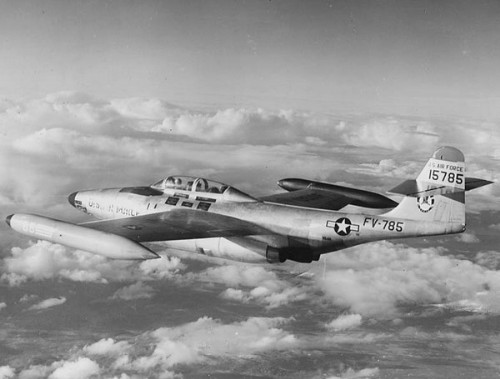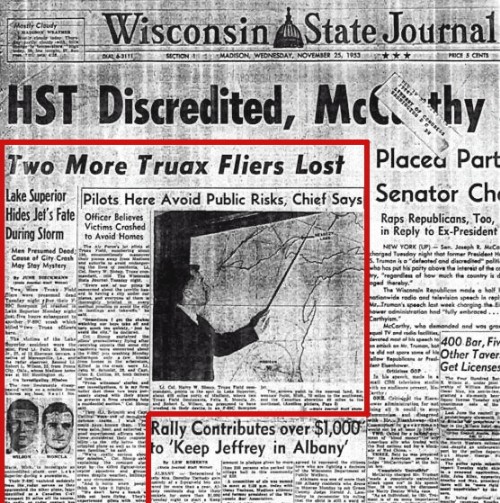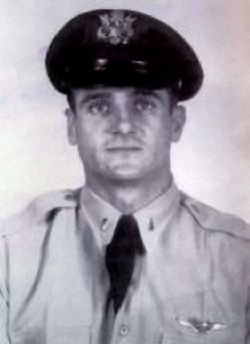UFO Case Report:
The Kinross Air Force Base Incident (jet disappears while chasing UFO)
Date: November 23, 1953
Location: Lake Superior, Michigan, United States
On the evening of 23 November 1953, an Air Force radar controller became alerted to an "unidentified target" over Lake Superior, and an F-89C Scorpion jet was scrambled from Kinross AFB. Radar controllers watched as the F-89 closed in on the UFO, and then sat stunned in amazement as the two blips merged on the screen, and the UFO left. The F-89 and it’s two man crew, pilot Felix Moncla and radar operator Robert Wilson, were never found, even after a thorough search of the area.

A Northrop F-89C Scorpion, like the one flown by Moncla and Wilson. (credit: Flight Collection)

Press article, regarding the incident, in the Wisconsin State Journal (Madison, WI), Nov. 25, 1953.

1st Lt. Felix E. "Gene" Moncla, Jr., pilot of the F89C Scorpion jet. Moncla was accompanied by radar operator Robert Wilson in the rear seat.
Classification & Features
Type of Case/Report: MajorCase
Hynek Classification: RV
Special Features/Characteristics: Pilot/Aircrew, Military, Radar, Witness Photo
More Articles on this Case
Kinross AFB/F-89 Disappearance
Richard Hall, NICAP
Summary of the Kinross AFB incident. "Exactly what happened that night remains unclear, as the Air Force acknowledges, and serious unanswered questions remain." R
Kinross Incident Case Directory
NICAP
"[Here] is the best compilation of evidence on this case... with 90% of that in the form of research and the collection of official documents by CUFON (The Computer UFO Network)."
Kinross AFB/USAF Report Of Aircraft Accident - Summary and References
CUFON (on NICAP website)
The 23 November 1953 "Kinross Case," wherein a US Air Force F-89C jet fighter was scrambled from Kinross AFB Michigan on an "active air defense mission" to intercept an "unknown aircraft" and disappeared with two crew members aboard, is considered by many to be one of the "UFO classics."
The Kinross Incident: Did a UFO abduct an Air Force jet interceptor and its crew in 1953?
Joel Carpenter, UFX
Report on the Kinross Incident, including official accounts obtained by Robert Todd under the Freedom of Information Act. Note that, surprisingly enough, there were *two* F-89s lost by the 433d Fighter Interceptor Squadron on November 23, 1953. R
Avoyelles Parish man's disappearance still a mystery after 50 years
The Town Talk (Alexandria, LA), July 20, 2003
Recent press article looking back at the disappearance of Air Force pilots Felix Moncla and Robert Wilson. R
The Kinross Incident: What Really Happened to the US Air Force F-89 Fighter Jet and Crew Lost Over Lake Superior?
Gord Heath, UFOBC
Since 2001, I have been investigating this incident and trying to find the truth behind this mystery. This report presents my findings which I hope will shed some light on the still unsolved mystery.
Full Report / Article
Source: Loy Lawhon, About.com
[go to original source]
"The Disappearance of Lt. Felix Moncla"
The channel that connects Lake Superior with the other Great Lakes flows through the Soo Locks near Saulte Ste. Marie, Michigan. On one side of the channel is the U.S., and on the other side is Canada. The fact that this area is on a U.S. national border makes it a restricted airspace. As such, it was monitored by the Air Defense Command in 1953.
On the evening of 23 November 1953, an Air Defense Command Ground Intercept radar controller at Truax AFB became alerted to an "unidentified target" over Soo Locks. He sounded the alert, and an F-89C Scorpion jet was scrambled from nearby Kinross Field. The jet was piloted by 1st Lieutenant Felix Moncla, Jr., with 2nd Lieutenant Robert Wilson in the rear seat as radar operator.
Ground Control vectored the jet toward the target, noting that the target changed course as the F-89 approached it at over 500 mph. Lt. Wilson had problems tracking the target on his onboard radar, so ground control continued to direct the jet to the target. For thirty minutes, the jet pursued the radar blip and began to close the gap as the UFO accelerated out over Lake Superior.
As Ground Control watched, the gap between the two blips on the radar screen grew smaller and smaller until the two blips became one blip. Ground Control thought that Moncla had flown over the target and that the two blips would separate again as he moved past it.
That didn't happen. Suddenly, the single blip flashed off the screen and the radar screen was clear of any return at all.
Frantically, Ground Control tried to contact the F-89 by radio. There was no response. Marking the last radar position, Ground Control dispatched an emergency message to Search and Rescue. That last sighting was about seventy miles off Keweenaw Point in upper Michigan, at an altitude of 8,000 feet, approximately 160 miles northwest of Soo Locks.
After an all night air/sea rescue search, not a trace of the plane or the men was ever found. No debris, no oil slick, nothing was ever found.
Officials at Norton Air Force Base Flying Safety Division issued a statement that "the pilot probably suffered from vertigo and crashed into the lake." However, this was merely speculation and was based on hearsay reports that Moncla was prone to vertigo.
The Air Force explained the unknown radar target at first as a Canadian DC-3, then later as a RCAF jet. Canadian officials responded that there were no Canadian aircraft in the airspace over the lake at any time during the chase. The Air Force finally stated that the F-89 had exploded at high altitude, ignoring the fact that this would have left a lot of debris on the lake surface.
NICAP investigators found that mentions of Moncla's mission - chasing an unidentified target - had been obliterated from official records. Project Bluebook files simply listed the case as an "accident."
Off the record, those that were present in the Ground Control radar room that day have expressed other opinions. They think that whatever the F-89 was chasing directly caused the disappearance of the jet...
Case ID: 610
edit: 610
FAIR
USE NOTICE: This page may contain copyrighted material the
use of which has not been specifically authorized by the
copyright owner. This website distributes this material without
profit to those who have expressed a prior interest in receiving
the included information for scientific, research and educational
purposes. We believe this constitutes a fair use of any such
copyrighted material as provided for in 17 U.S.C § 107.





